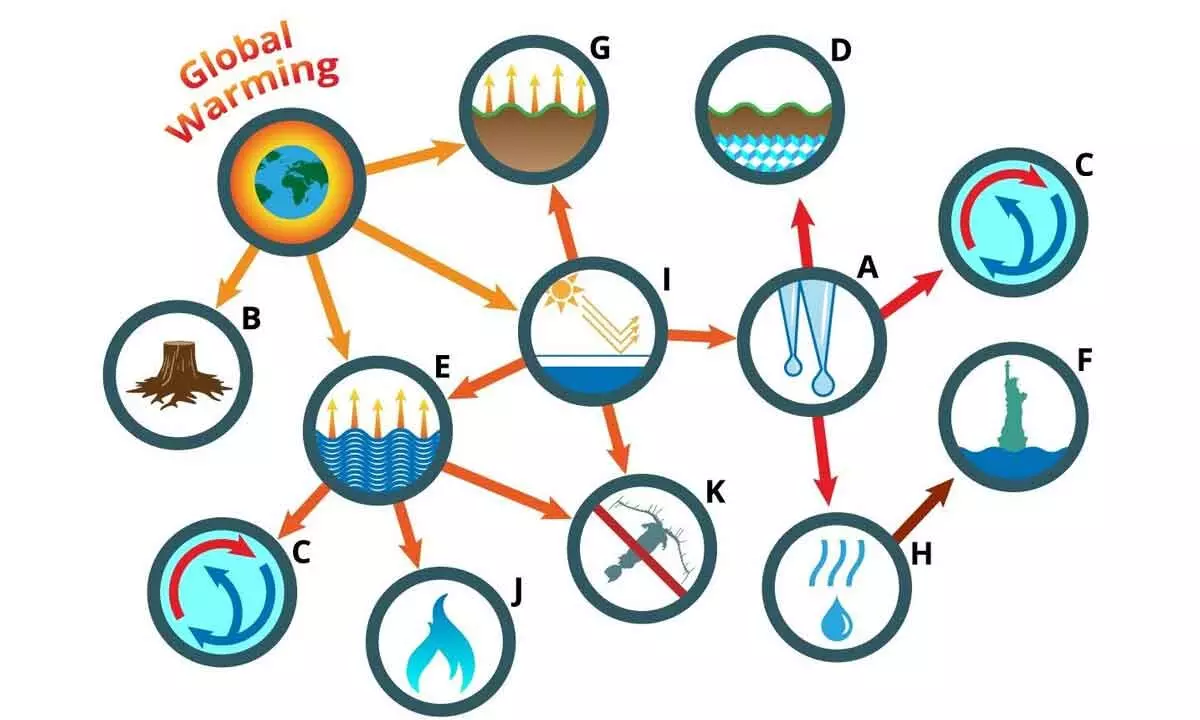Live
- IPL 2024: Will Jacks, Kohli shock Gujarat, keep RCB's playoff hopes alive
- IPL 2024: 'Can't sit and speak from a box', Virat Kohli slams strike-rate critics
- ISL 2023-24: We have to give our everything, says FC Goa's Fernandes ahead of semis clash with Mumbai City
- Study confirms air pollution increases risk of Alzheimer's disease
- Pakistan Foreign Minister Ishaq Dar appointed Deputy Prime Minister
- BRS alone can stall attempts to make Hyderabad a union territory: KTR
- AIADMK slams TN govt for collecting fee for summer sports coaching camps
- Ujjwal Nikam praises Modi govt for 'ruthless' approach against terrorism, giving befitting reply to Pakistan
- Indian Coast Guard apprehends Pakistani boat with huge consignment of narcotics
- PM Modi's steadfast campaign: Sustaining opposition to Congress' 'appeasement' politics
Just In
Earth dangerously poised on the brink of tipping points


“As we approach these tipping points, we will already begin to experience the impacts,” warned the lead author of the new study. “Once, crossed it will be difficult to go back.” That Could ‘Destroy Very Systems Our Life Depends On’
Human activity is pushing Earth to the brink of major “risk tipping points” that, if triggered, could have catastrophic impacts on life-sustaining ecosystems, warns a report released Wednesday by the United Nations University’s Institute for Environment and Human Security.
The new report identifies six risk tipping points that human actions, principally the burning of fossil fuels, have introduced and intensified: accelerating species extinctions, groundwater depletion, mountain glacier melting, space debris, unbearable heat, and an uninsurable future.
Distinct from “climate tipping points” signifying when major changes to the climate system become unstoppable, risk tipping points “are not always physical, and climate change is just one of the many drivers of risk,” the report explains.
“Many new risks emerge when and where our physical and natural worlds interconnect with human society,” the report states. “A risk tipping point is the moment at which a given socioecological system is no longer able to buffer risks and provide its expected functions, after which the risk of catastrophic impacts to these systems increases substantially.”
Dr. Zita Sebesvar, the lead author of the new report, said that “as we indiscriminately extract our water resources, damage nature and biodiversity, and pollute both Earth and space, we are moving dangerously close to the brink of multiple risk tipping points that could destroy the very systems that our life depends on.” “Additionally, we also lose some of our tools and options to deal with future disaster risk,” Sebesvar added.
The report stresses that the risk tipping points it examines are not a “theoretical threat,” and their impacts could have—and are already having—ripple effects across interconnected systems. For example, the report notes that the current species extinction rate is “at least tens to hundreds of times higher” than it would typically be due to human activity. Because ecosystems are “built on intricate networks of connections between different species,” the report says, the extinction of dependent species can set off “a chain reaction of extinctions that could end in the ecosystem’s collapse.”
When mountain glaciers retreat due to warming temperatures, the report adds, their ice “gradually melts and increases the amount of water flowing to the river basin.” “With more meltwater, the risk of flooding downstream increases. In some cases, this can lead to ‘glacial lake outburst floods,’ in which a natural dam fails and suddenly releases meltwater with devastating consequences,” the report observes. “Eventually, the glacier experiences its highest amount of melting and produces the maximum volume of water runoff, known as ‘peak water.’ After this point, freshwater availability will steadily decline.”
The report argues that there are a number of root causes pushing Earth toward perilous risk tipping points, including human-caused greenhouse gas emissions, prioritizing profits over environmental and protections, and colonialism. “As we approach these tipping points, we will already begin to experience the impacts,” warned Dr. Jack O’Connor, a lead author of the study. “Once, crossed it will be difficult to go back.”
The report places possible solutions to avert—or, at minimum, mitigate—the impacts of risk tipping points into two broad categories: avoid and adapt. Within those two categories, the report puts potential action into the subcategories of “delay” and “transform.”
In the case of increasingly extreme heat, the report states that “an adapt-delay solution would aim to counteract this risk by installing air conditioners.” “An avoid-transform solution, on the other hand, would aim to halt the emissions of greenhouse gasses and at the same time drive societal change toward low-carbon ways of living so the tipping point can ultimately be avoided,” the report says.
(Courtesy: https://www.commondreams.org/; Writer is a senior editor and staff writer for Common Dreams)

© 2024 Hyderabad Media House Limited/The Hans India. All rights reserved. Powered by hocalwire.com






